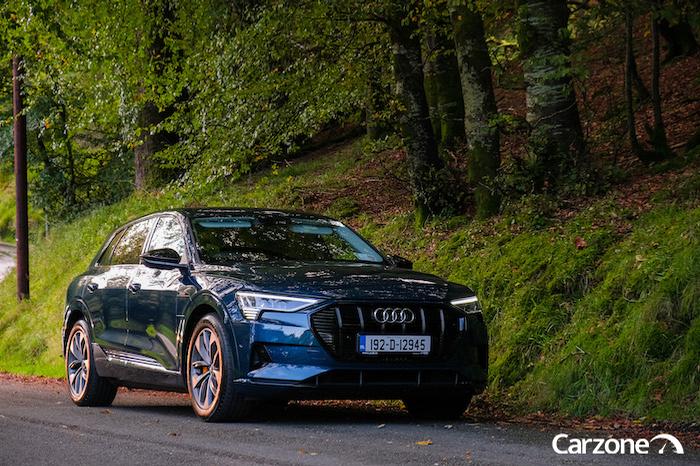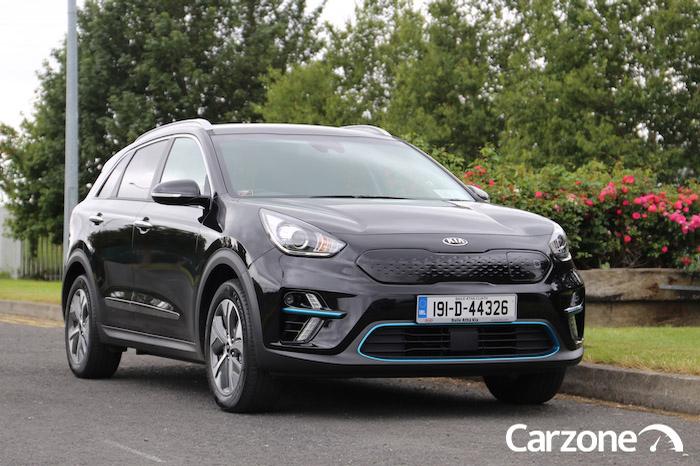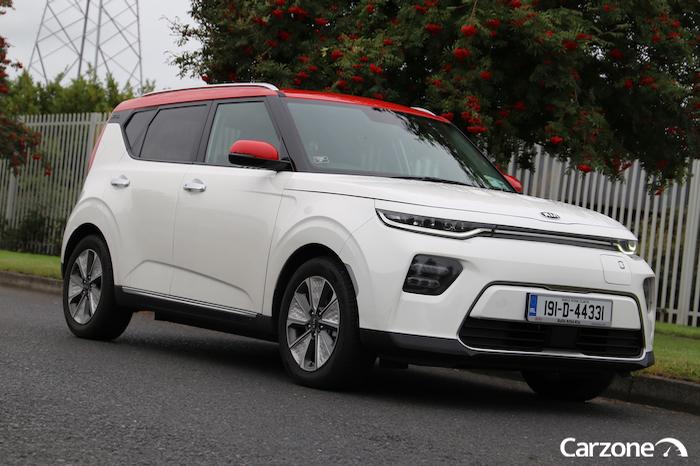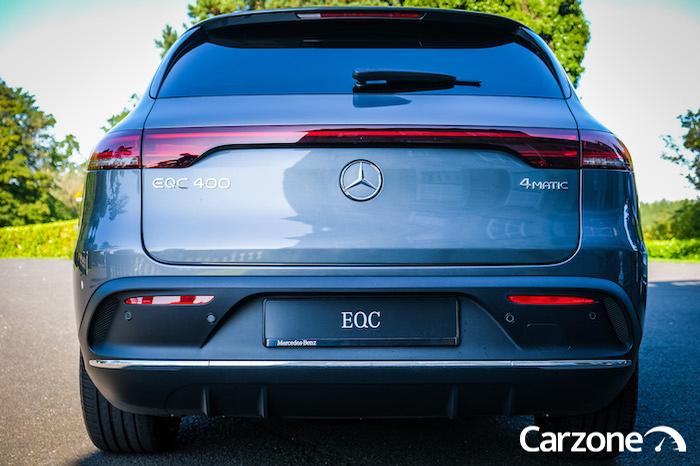We’re told that the future of motoring is full-electric vehicles (EVs) and manufacturers are in a race to get their zero-emissions cars onto the market as soon as they can. But here are our favourite EVs that are already on sale in Ireland.
Audi e-tron 55 quattro
The Audi e-tron is one of a new wave of luxury, electric SUVs, following in the wake of the Tesla Model X. Audi’s effort looks very normal on the outside (unless it has the rear-view cameras in place of the door mirrors) and that’s why it’s such a great family car. The e-tron 55 quattro has a 408hp motor, so it’s quick (0-100km/h in 5.7 seconds), but its 95kWh battery pack allows for a 400km WLTP-ratified range on a full charge. The e-tron is not cheap, starting at around €92,000 including the SEAI grant, but it is an excellent all-rounder.

BMW i3
An oldie but a goodie, the i3 has been around in its current form since 2013. It has had 60Ah, 94Ah and 120Ah battery packs during its life, all of which have gone to extending its range to the current 310km maximum on the WLTP cycle. The BMW’s strength is it looks fabulous; the German company went all-in for the futuristic look when it styled the i3 city hatch and it still appears fresh and distinctive today. For fans of better performance, there’s an i3s available with a more potent 184hp motor (the regular car has 170hp) and different suspension, but if you still want a new BMW i3, better move fast – the car won’t be on sale for much longer.
Hyundai Ioniq Electric
Hyundai’s Ioniq is perhaps one of the most conventional EVs on sale, if that appeals, with a smoothed-off fastback body and a modest 136hp engine. In late 2019, its original 28kWh battery pack was replaced with a 38.3kWh item, increasing the Ioniq’s WLTP range to 312km. That’s pretty decent, if perhaps not quite as good as the next Hyundai on our list.
>View Hyundai Ioniq's For Sale
Hyundai Kona Electric 64kWh
This is one of two cars that significantly moved the affordable EV game on when it appeared later on during 2018. Based on Hyundai’s B-segment crossover, the Kona, the Electric version is undoubtedly the best model in the line-up. It uses a whopping 64kWh lithium-ion battery pack to allow for a WLTP-ratified maximum range of 449km, making it one of the longest-running EVs on a single charge this side of anything with a Tesla badge. Factor in that its 150kW (204hp) electric motor allows for punchy performance (0-100km/h in 7.6 seconds), a starting price of less than €40,000 including SEAI grants and looks that are arguably nicer than those of its conventionally powered siblings, thanks to the Electric’s blanked-off front grille, and this is one of the greatest new family EVs you can currently buy.
.jpg)
>Read our Hyundai Kona EV Review
Jaguar I-Pace EV400
Along with the Tesla Model X, this Jaguar was something of a game-changer. Here was one of the traditional premium marques, getting in on the electric SUV act nice and early. Jaguar’s real masterstroke, however, was executing the I-Pace so well. It manages to deliver a huge WLTP-ratified range of 470km from a 90kWh lithium-ion battery, while its 400hp electric motor allows it to run 0-100km/h in just 4.8 seconds – meaning it is as sporty and fast as some of Jaguar’s most hallowed, historic products. It has striking looks on the outside and a bespoke interior layout too, so it feels like a special car when you’re merely sat in it, and if it weren’t for a high purchase price approaching €100,000 including grants, then this should be one of the first big EVs on your list if you’re in the market for such a thing.
>View Jaguar I-Paces's For Sale
Kia e-Niro 64kWh
Closely related to the Hyundai Kona Electric, the Kia e-Niro perhaps doesn’t look quite as good as its fellow Korean cousin, but it counters by eking slightly more range out of its 64kWh battery (455km in total, WLTP) and it’s ever so slightly cheaper than the Kona Electric, plus it has the longer, seven-year Kia warranty too. Pick either this or the Hyundai, though, and you’ll have a superb zero-emissions family crossover.

Kia e-Soul
Kia is one of the car companies that is clearly happy to pick up the electric baton and run with it, because here’s another all-electric, relatively affordable, family EV from the Korean outfit. It’s the e-Soul, based on the third generation of Kia’s boxy MPV-like crossover, and the reason you’d pick this instead of an e-Niro is because the e-Soul is far more interesting to look at. The mean front-end styling and two-tone colour options really give it some youthful buzz, while the same 204hp drivetrain as the e-Niro and the Hyundai Kona Electric delivers decent performance on this upright, practical machine. A 452km WLTP range is not to be sniffed at, either.

Mercedes-Benz EQC
Mercedes, like Volkswagen and its ID sub-brand coming later in 2020, wants to make all of its pure electric models stand apart from the mainstream range of vehicles it sells. To that end, there will be further EQ- models, such as an EQA and an EQS, for example. The first, though, is the EQC, another large prestige EV designed to take on the Audi e-tron and the Jaguar I-Pace. To that end, its 408hp/760Nm outputs place it in direct competition with those two cars, while an 80kWh battery pack allows the GLC-sized EQC to go up to 417km (WLTP) on a single charge. A 500-litre boot also means it’s a relatively practical family chariot.

>Read our Mercedes-Benz EQC Review
>View Mercedes-Benz EQC's For Sale
Nissan Leaf 62kWh
Where would any list of the best EVs be without the best-selling EV of all? The Nissan Leaf was ahead of the game when it launched in 2010 and the second generation arrived in 2017. This newer car was less unusual to look at and had an improved interior, and after it launched with a 40kWh battery three years ago, Nissan added an even bigger 62kWh battery in 2019 that pushed its range out once more to a WLTP-quoted 385km. Not only that, but the 62kWh model gains an uprated, 217hp motor, which means it has hot-hatch-like acceleration – 0-100km/h takes just 6.9 seconds. Better still, Leaf prices start at less than €30,000, including all relevant grants.
.jpg)
Peugeot e-208
The Peugeot e-208 preceded its Opel cousin to market and, for us, is the even more superior car. You need to specify it correctly to avoid a hard ride, so the top-spec GT might be worth avoiding, but with prices starting from around €26,000 with the SEAI grant factored in, this is one of the most inexpensive cars on the list. And yet it looks sensational on the outside, while the cabin is one of the best in the business. The e-208’s genius is that it is basically a conventional hatchback, only with a forward-thinking drivetrain – you’ll get a WLTP-confirmed 340km maximum out of a single charge of the 50kWh battery pack.
>View Peugeot e-208's For Sale
Porsche Taycan
If the Honda e built up the EV hype at an affordable level, the Porsche Taycan did much the same thing at a dream-car level prior to its 2019 launch. This machine is Porsche’s signal to move to an electrified future, while maintaining the sharp-driving, high-performance ethos that the marque if fabled for. The Taycan originally launched with the two fastest derivatives, the 687hp Turbo and the outrageous 761hp Turbo S, with their cruising ranges rated at up to 453km (Turbo) or 420km (Turbo S) on the WLTP cycle. It’s the repeatability of the Taycan’s performance that impresses most, however, as it will repeat its scorching 2.8-second 0-100km/h time (Turbo S) up to 20 times on a single charge, showing Porsche’s impressive battery management tech. Soon after the Turbo models, Porsche added a more affordable 4S version, with 571hp and a maximum theoretical range of 462km. However, as even the Taycan 4S begins at €115,375, this is not an affordable EV – but it is a devastatingly talented one.
Renault Zoe R135 ZE50
The Renault Zoe, using some of the technology gleaned from sister company Nissan and its 2010-launched Leaf, arrived in 2012 and has proved a popular car since then. A fully electric alternative to the Clio supermini, the Zoe began life with a 90hp motor and a 22kWh battery pack, but that was later enlarged to 41kWh for more range, before a more powerful 110hp propulsion system was introduced too. However, the best Zoe is the most recent – a facelift in 2019 changed the pebble-like Renault’s appearance and introduced a 135hp motor with a 52kWh battery pack, allowing for a 386km maximum range. It’s the nicest all-round Zoe, proving equally adept out of town as it is within urban confines, but if you team the 52kWh battery pack to the 110hp motor than the Renault’s range increases to an impressive 395km WLTP.
Tesla Model 3 Long Range
We conclude this list with a Tesla, which is only fitting as it was this disrupting American technology brand that really kick-started the EV revolution and scared the mass-production car companies to up their game. We have mentioned the Model X, the company’s gullwing-doored SUV, and that’s a superb machine in its own right, but the newer, more affordable Model 3 is the car we’re going to champion here. As the Long Range model, it has a 75kWh battery pack and an enormous 538km WLTP range, more than any other car on this list. It also has a 283hp drivetrain, which’ll push the car from 0-100km/h in 5.1 seconds and on to a top speed beyond 200km/h. Buyers will also enjoy Tesla’s trademark 15-inch portrait infotainment screen, which makes the cabin feel like no other car.